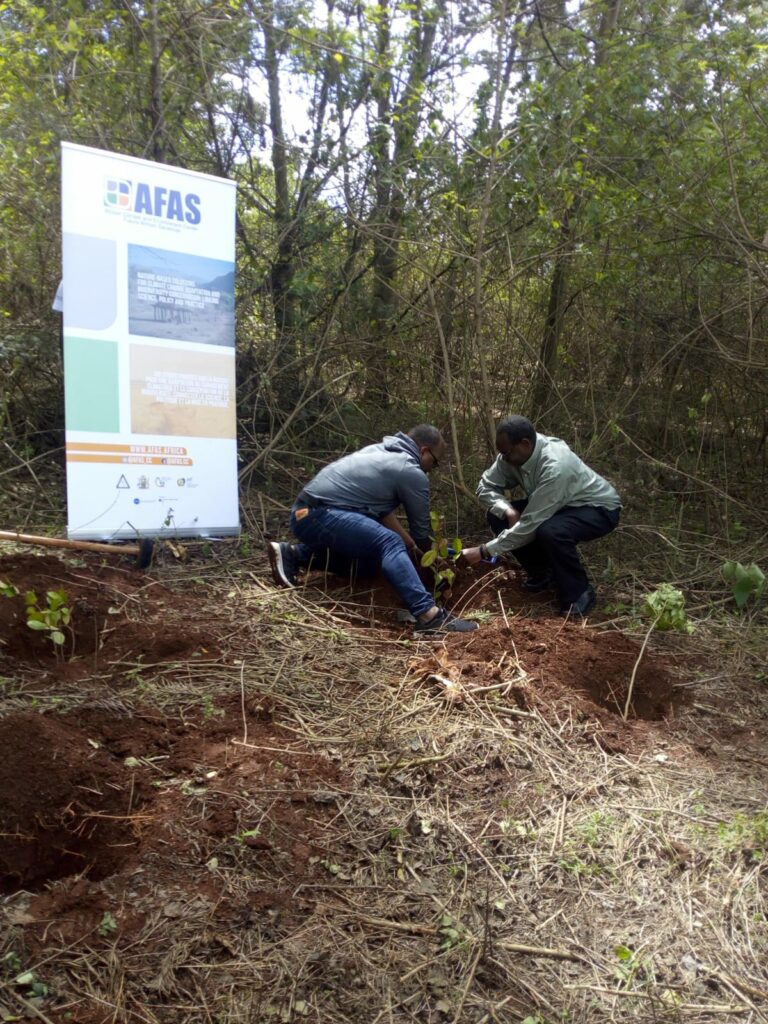
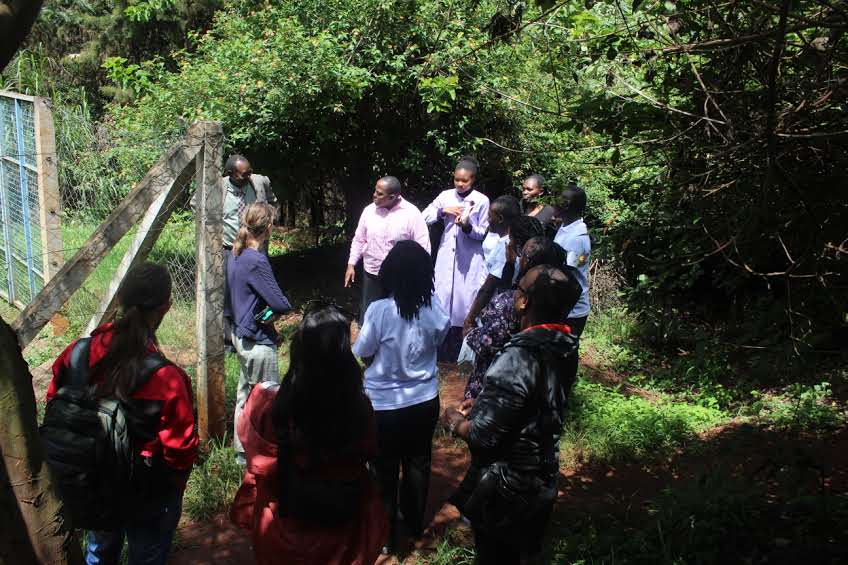
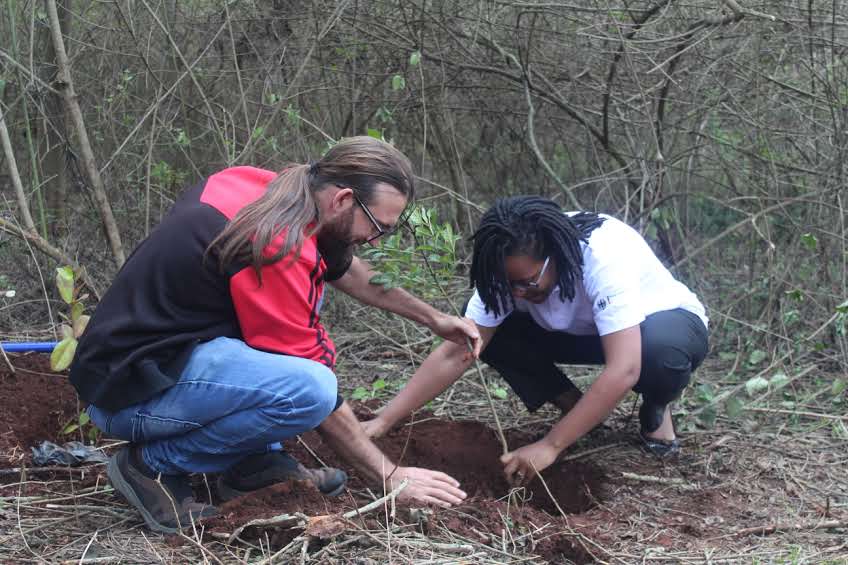
There is this famous quote which states that “The best time to plant a tree was twenty years ago. The second-best time to plant a tree was yesterday.” It is at this backdrop that the Future African Savannas (AFAS) project team, led by its Principal Investigators Prof. Daniel Olago (Institute for Climate Change and Adaptation- University of Nairobi (UoN), Kenya) and the projects’ coordinators Dr. Juliet Kamau (Centre for Development Research (ZEF)-University of Bonn, Germany), Dr. Gerda Kuiper (Global South Studies Centre – University of Cologne, Germany), Prof. Ngolo Kone (African Center of Excellence for Climate Change, Biodiversity and Sustainable Agriculture-Université Félix Houphouët-Boigny (UFHB), Abidjan, Côte d’Ivoire) and Ms. Lewnorah Ayietta (Institute for Climate Change and Adaptation (ICCA)-University of Nairobi, Kenya) had the team taking up a tree planting exercise at the Wangari Maathai Institute for Peace and Environmental Studies. The institute is a Vision 2030 flagship project which was built in honor of the late Nobel Laureate Prof. Wangari Maathai who played a pivotal role in forest conservation, governance and the culture of peace in Kenya and was a professor of the University of Nairobi. The institute is situated along Kapenguria Road off Waiyaki Way and it is a model of a green campus. In addition to the above-mentioned people, the AFAS team comprised of Dr. Bessy Kathambi (UoN), Dr Thuita Thenya (UoN) and Dr. Christine Omuombo (Technical University of Kenya (TUK)). The team also included PhD students – Yvonne Githiora and Timothy Downing as well as master’s students; Ms. Marie Arellano (Global South Studies Center- University of Cologne, Germany), Mr. Joseph Ndiba, Ms. Anulisa Claire Adhiambo, Ms. Grace Kamau and Mr. Pius Domokong, all from the University of Nairobi’s Institute for Climate Change and Adaptation. This exercise took place on 29 November 2022.
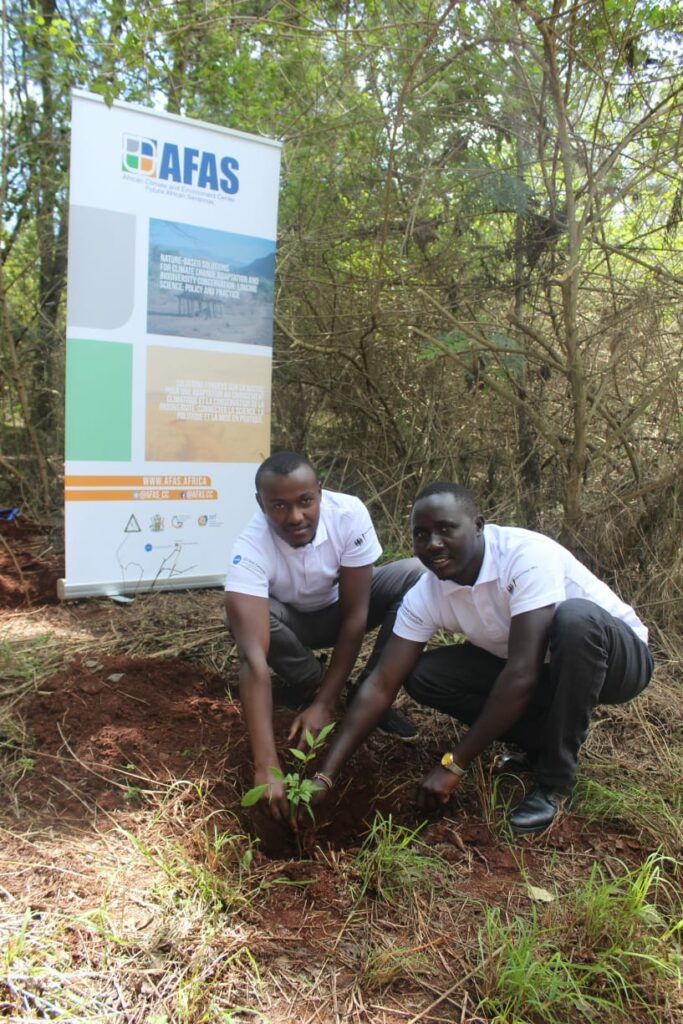
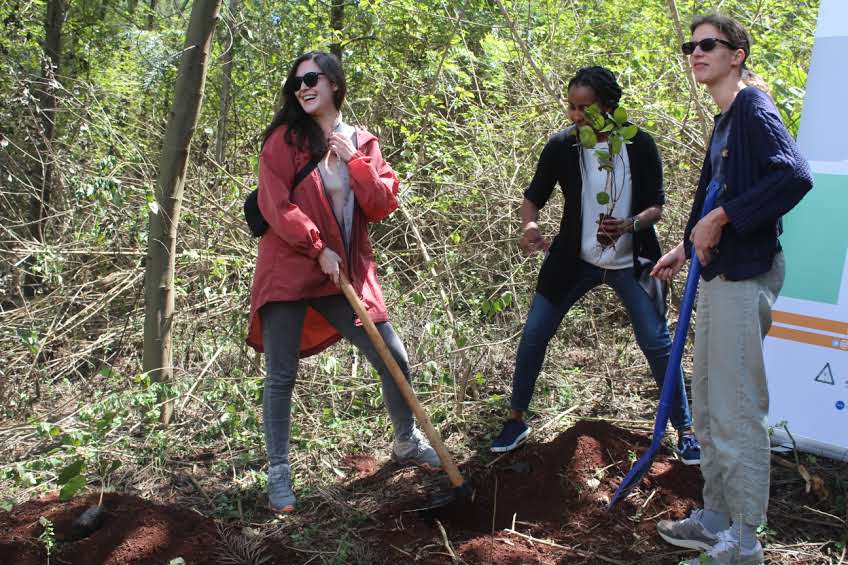
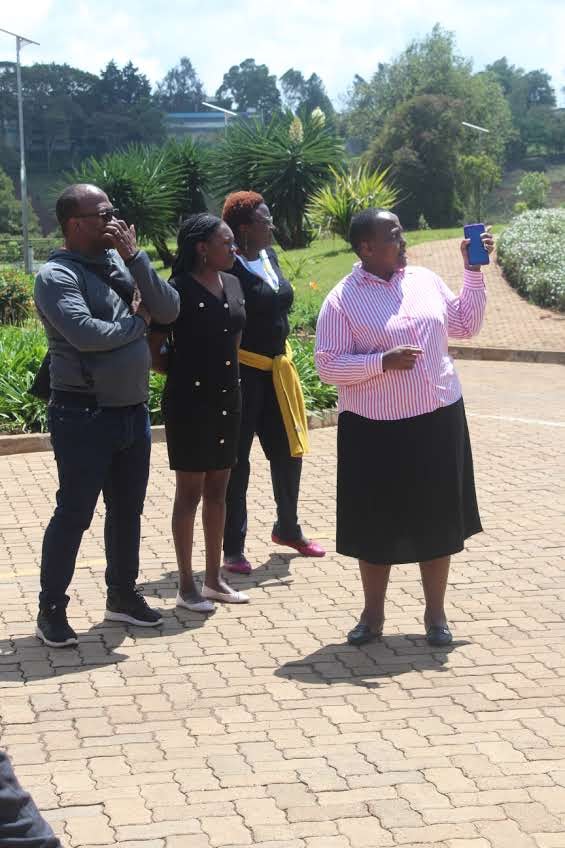
A key component of the AFAS project is the adoption and scaling up of nature-based solutions to address societal challenges within the African Savannas. Coincidentally, the Nairobi City County, where Wangari Maathai Institute for Peace and Environmental Studies is located lies within the African Savanna biome. By adopting the definition as put out by the International Union Conservation of Nature (IUCN) (2016), nature-based solutions are “Actions to protect, sustainably manage and restore natural or modified ecosystems that address societal challenges, effectively and adaptively, simultaneously providing human wellbeing and biodiversity benefits.” From this definition, trees act as a nature-based solution in a myriad of ways. They include carbon sequestration and storage, soil erosion control, air filtration, flood control, oxygen provision, groundwater recharge, temperature regulation among others (Ratnam et al., 2020). In an urban setup, trees help reduce the impacts of heat island effect, a viable advantage owing that the Wangari Mathai Institute is situated within Kenya’s capital city, Nairobi.
However, it is interesting to note that tree planting alone acts as nature-based solutions only when the right tree species are planted at the right ecological space, which is supported by the right climatic conditions. Planting trees in areas such as open grasslands can jeopardize the entire ecosystems by converting it into a woody grassland. In addition, the hydrological terrain of such an ecosystem can change through drying up of rivers and swamps therefore impacting negatively the biodiversity and human livelihoods dependent on them. Conserving and protection of the existing natural forests is very important as it provides more benefits including offsetting more atmospheric carbon as compared to the amount of carbon which we seek to offset through the anomalous tree planting initiatives. Protecting these forests also allows them to regenerate themselves (Voices, 2020). The existing savanna and grassland ecosystems on their part store huge tons of carbon below the ground and this, as Voices (2020) note, has often been ignored in carbon budgets. Therefore, the savannas and grasslands too should be managed and protected if the world is to increase the carbon sinks.
Various tree species were planted to optimize on nutrient uptake and thus increase their survival. The students on their part took up the role of providing stewardship to the trees, through among others regular watering to ensure they grow to maturity. They also pledged to scale up tree planting activities through active participation in tree planting exercises across the country as well as adhering to the concept of right tree species at the right environment, to avoid jeopardizing other ecosystems. Indeed, the AFAS team is living up to its core objective, through adopting and implementing nature-based solutions actionably, leading by example and also through linking science with practice.
Thereafter, the team commemorated the late Nobel Laureate Prof. Wangari Maathai, who the Wangari Maathai Institute for Peace and Environmental Studies is named after. In particular, the team reflected on the famous ‘Hummingbird’ story, and the three pillars of a sustainable society as symbolized by an iconic ‘Three-legged African Stool’ structure built within the Wangari Maathai Institute’s compound. In the late Prof. Wangari Maathai’s words, the three pillars represent Sustainable Environmental Management, Democratic Governance and a Culture of Peace, as key elements for there to be sustainable development in any sphere of society. Indeed, though the late Prof. Wangari Maathai passed on more than a decade ago, her legacy and the values she championed for lives on. AFAS team members also want to be the little humming birds in the tropical savanna in Africa!
Photography credit: Ms. Jane Watiri University of Nairobi
Bibliography
Information about the author:
Joseph N. Ndiba is an AFAS fellow from the 1st master cohort based at the University of Nairobi in Kenya.
(juniorndiba[at]gmail.com/ ndibajoseph[at]students.uonbi.ac.ke)